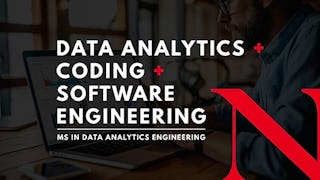Filter by
SubjectRequired
LanguageRequired
The language used throughout the course, in both instruction and assessments.
Learning ProductRequired
LevelRequired
DurationRequired
SkillsRequired
SubtitlesRequired
EducatorRequired
Explore the Information Theory Course Catalog

West Virginia University
Skills you'll gain: Unified Modeling Language, Verification And Validation, Threat Modeling, Enterprise Architecture, Security Management, Secure Coding, Scope Management, Application Security, Financial Statements, Proposal Development, Cash Flows, Object Oriented Design, Requirements Analysis, Software Design, Security Requirements Analysis, Database Design, Software Visualization, Object Oriented Programming (OOP), Business Process Management, Mobile Security

Universidad de los Andes
Skills you'll gain: Test Automation, Android Jetpack, User Story, Software Testing, Kotlin, Agile Software Development, Team Building, Security Requirements Analysis, Continuous Integration, Cloud Applications, Infrastructure As A Service (IaaS), Unit Testing, Acceptance Testing, Usability, Software Engineering, Sprint Retrospectives, Application Security, Software Architecture, Web Content Accessibility Guidelines, Platform As A Service (PaaS)

University of London
Skills you'll gain: Virtual Reality, Human Computer Interaction, Game Design, Full-Stack Web Development, React Native, Agile Software Development, Animations, Data Ethics, Git (Version Control System), Event-Driven Programming, Network Security, Web Applications, Data Science, Natural Language Processing, Unsupervised Learning, Combinatorics, Database Design, Web Development, Generative AI, Usability Testing

Northeastern University
Skills you'll gain:
 Status: New
Status: NewCoursera Instructor Network
Skills you'll gain: Data Import/Export, Alteryx, Data Visualization, Business Analytics, Data Governance, Workflow Management, Operational Efficiency, Data Cleansing, Data Management, Data Manipulation, Data Transformation, Data Analysis, Business Process Automation, Data Integration, Automation

Skills you'll gain: Artificial Intelligence, Data Ethics, Data Analysis, Software Visualization, Exploratory Data Analysis, Technical Documentation, Applied Machine Learning, Machine Learning Methods, Machine Learning

O.P. Jindal Global University
Skills you'll gain: Operations Management, Data Storytelling, Design Thinking, Active Listening, Business Ethics, Data Visualization, Working Capital, Financial Statement Analysis, Database Management, Environmental Social And Corporate Governance (ESG), Sampling (Statistics), Project Estimation, Business Analytics, Global Marketing, Predictive Analytics, Human Resources Management and Planning, Internet Of Things, Big Data, Regression Analysis, Marketing

University of Colorado Boulder
Skills you'll gain:
University of Illinois at Urbana-Champaign
Skills you'll gain:

Universidad de los Andes
Skills you'll gain: Real-Time Operating Systems, Supervised Learning, Unsupervised Learning, Anomaly Detection, Computer Vision, Reinforcement Learning, Cloud-Native Computing, Natural Language Processing, Containerization, Deep Learning, Dimensionality Reduction, Artificial Intelligence, Machine Learning, CI/CD, Probability & Statistics, Control Systems, Data Ethics, Application Deployment, Epidemiology, Education Software and Technology

University of London
Skills you'll gain: Virtual Reality, Human Computer Interaction, Game Design, Full-Stack Web Development, React Native, Agile Software Development, Animations, Data Ethics, Git (Version Control System), Event-Driven Programming, Network Security, Web Applications, Data Science, Natural Language Processing, Unsupervised Learning, Combinatorics, Database Design, Web Development, Generative AI, Usability Testing

University of London
Skills you'll gain: Virtual Reality, Human Computer Interaction, Game Design, Full-Stack Web Development, React Native, Agile Software Development, Animations, Data Ethics, Git (Version Control System), Event-Driven Programming, Network Security, Web Applications, Data Science, Natural Language Processing, Unsupervised Learning, Combinatorics, Database Design, Web Development, Generative AI, Usability Testing
Information Theory learners also search
In summary, here are 10 of our most popular information theory courses
- Master of Science in Software Engineering: West Virginia University
- Metodologías ágiles de desarrollo de software Certificado MasterTrack®: Universidad de los Andes
- Bachelor of Science in Computer Science: University of London
- Master of Science in Data Analytics Engineering: Northeastern University
- Alteryx Mastery: Data Analytics & Workflow Automation: Coursera Instructor Network
- Responsible AI for Developers: Interpretability & Transparency - Polski: Google Cloud
- MBA Business Analytics: O.P. Jindal Global University
- Master of Science in Artificial Intelligence: University of Colorado Boulder
- Master of Computer Science (feat. Data Science Track): University of Illinois at Urbana-Champaign
- Maestría en Inteligencia Artificial: Universidad de los Andes











